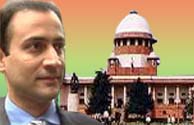Indian businessman gets five years in jail in hit-and-run case
 New Delhi - Businessman Sanjeev Nanda was sentenced Friday to five years in jail for running over and killing six people, including three police officers, in 1999 in New Delhi.
New Delhi - Businessman Sanjeev Nanda was sentenced Friday to five years in jail for running over and killing six people, including three police officers, in 1999 in New Delhi.
Nanda, 30, was found guilty by a city court Tuesday after a nine-year trial, which saw most witnesses turn hostile.
Another accused, Rajeev Gupta, was sentenced to a year in prison for destruction of evidence while his two domestic helpers were given six months each on the same charge.
The prosecution had asked for Nanda to be given the maximum punishment of 10 years in prison in the hit-and-run case that was being seen as yet another test of whether the common man can get justice when the accused are wealthy and powerful.
Nanda belongs to an influential business family. His grandfather was chief of the Indian Navy, and his father is an international arms dealer. Most of the people mowed down by his car were poor people.
Nanda, who spent nine months in jail before he was released on bail, was found guilty on the basis of scientific and forensic evidence, prosecution lawyers said.
Two others - who were passengers in Nanda's BMW that mowed down the victims at a police picket on Lodi Road in south Delhi in the early hours of January 10, 1999 - were acquitted for lack of evidence.
Three men died immediately and three more died in hospital. One survived.
An oil slick was traced to the BMW stowed in a garage of a house owned by Rajeev Gupta near the site of the accident. The police found traces of blood and flesh on the car front and tyres.
Nanda's attorneys said their client would appeal.
India has seen at least three verdicts against scions of wealthy or influential families in the past few years with the media and social activists playing a pro-active role.
All the trials took six to eight years and saw allegations of crucial evidence being destroyed and key witnesses retracting statements.
Under India's judicial system, once a lower court pronounces a verdict, a convict can appeal the decision to the High Court and then the Supreme Court. (dpa)